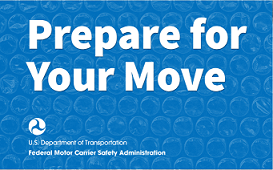OUR BLOG

By sites
•
May 3, 2022
Working with a household goods carrier (mover) can be nerve-racking. You are packing up all your treasured possessions – furniture, family, pictures, heirlooms, antiques, children’s toys – and handing them over to strangers to load into a truck. While most moves go smoothly, accidents do happen, and some items may be lost or damaged during shipment. Your mover is responsible for the value of the goods you asked them to transport. You can read about the two types of liability below or in the Your Rights and Responsibilities When You Move booklet movers are required by Federal regulations to provide when you move from one state to another. What are your options? Under Federal law, interstate movers must offer two different liability options referred to as valuation coverage: Full Value Protection and Released Value. Full Value Protection Under Full Value Protection, your mover is responsible for the replacement value of lost or damaged goods in your entire shipment. This is the more comprehensive, but also more expensive, option for protecting your belongings. Unless you choose the Released Value option, described below, your mover will automatically move your belongings under this level of liability. While moving, if any of your items are lost, destroyed, or damaged, your mover will offer to do one of the following for each item:

By sites
•
May 3, 2022
When your move is complete, it’s important to take inventory to ensure all your belongings are where they should be. If you realize there is a problem, the FMCSA is here to help. Take the following actions to ensure you stay protected and get everything you’re entitled to. Refer to your mover's dispute settlement program Before moving your household goods, an interstate household goods carrier (mover) must provide you with information regarding their dispute settlement program. Movers must offer a neutral dispute settlement program as a means of settling disputes that may arise concerning loss or damage of your household goods. File a claim for lost or damaged goods If your goods are damaged or missing at delivery, request a company claim form from the mover. Complete the claim form to the best of your ability. The mover will tell you where to mail the completed form. You must file a written claim with the mover within 9 months of delivery. Your claim must be in writing but does not have to be submitted on a mover's claim form. It is suggested that you send the claims information to the mover by certified mail. If you are not satisfied with the settlement offer made by the mover, you have the option of submitting a loss and damage claim with the mover's dispute settlement program or to seek other legal remedies.

By sites
•
April 3, 2022
Before moving your belongings to a new state, movers and brokers are required to give you the booklet entitled Your Rights and Responsibilities When You Move. This booklet will help you understand the documents that a mover will ask you to sign and explain your rights if your items are lost or damaged.

By sites
•
July 1, 2019
Every year, 35 million Americans move for personal reasons or career opportunities. Moving your belongings and family to a new state can be stressful, even under the best of circumstances. The Federal Motor Carrier Safety Administration (FMCSA) is here to help. If you’re moving to a new state, we can help you protect your move by: Helping you learn to spot the red flags of moving fraud Offering tips for a successful move Alerting you to your rights and responsibilities Provide a handy moving checklist for before and during your move The federal government, state and local law enforcement agencies, and the legitimate moving industry have joined forces to combat moving fraud, but you have an important role to play as well. If you’re planning to move, it’s important to do your research and plan appropriately.


